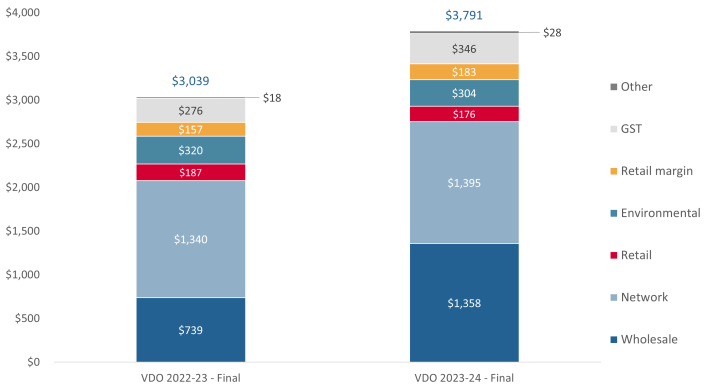Victorian small businesses face average electricity increases of up to 25% over the coming few months, as a result of the Victorian Default Offer (VDO) changes.
For small business customers, this equates to an average increase of $752 per year, assuming your annual usage is 10,000 kWh.
Why is this occurring and what does this mean for your small business and what can you do about it?
What is the VDO and who sets it?
The Victorian Default Offer (VDO) is an "independently set power price that acts as a benchmark for the rest of the market". (ABC)
Victoria’s energy regulator, the Essential Services Commission (ESC) sets the default offer each year, based on an independent analysis of the efficient costs of buying and supplying electricity in Victoria. They also consult with industry and the community to inform their decision.
In line with this, energy suppliers in Victoria must not only offer the Victorian Default Offer (VDO), but they are also required by law to use the default offer as a reference price when they advertise retail market offers.
The revised Victorian Default Offer prices apply from 1 July 2023 to 30 June 2024.
What is driving this energy rate increase?
The key driver behind the default offer price is high wholesale energy market prices, driven by volatility from 2022. At the time, volatility increased the prices energy suppliers paid to secure electricity from the wholesale (futures) market to pass onto consumers.
How does this year's increase compare to the previous year's increase ?
According to the ESC, the 2022-23 Victorian Default Offer was projected to increase small businesses electricity bills by 5% compared to the previous year. In comparison, the 2023-24 Victorian Default Offer this year claims increases of up to 25%.
This is a significant difference and directly relates to the increase in volatility and supply and demand over the last twelve months.
Prices across the state will also vary due to the different network tariffs in each of Victoria’s five distribution zones.
See the ESC chart below which shows the change in average Victorian Default Offer annual bill by cost component, for small business customers with annual usage of 10,000kWh, $ nominal.

What is the difference between the Victorian Default Offer and Default Market Offer?
According to the Essential Services Commission, both are reference prices designed to make it easier for consumers to compare energy plans from different retailers.
- The Victorian Default Offer is the Victorian safeguard. It’s a price set by the Essential Services Commission, Victoria’s energy regulator.
- The Default Market Offer applies in New South Wales, South Australia and south-east Queensland. It is set by the Australian Energy Regulator and is a maximum total bill amount energy companies can charge for ‘standing offer’ prices.
What can businesses do to tackle rising energy costs?
Many business operators are naturally concerned about the impact these increases will have on their operational costs.
While energy prices are on the increase, the Victorian Default Offer is not meant to cause alarm or offer the lowest price in the market.
It is purely a reference price to help Victorian consumers compare energy deals as provide greater transparency.
Small businesses are strongly encouraged to undertake their own independent comparison - or better yet, work with an energy broker like Choice Energy who can provide expert energy comparison, hassle free, with greater ease and transparency.
Businesses can learn more at: https://www.esc.vic.gov.au/